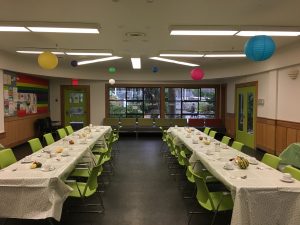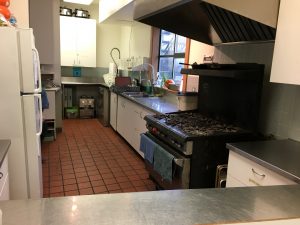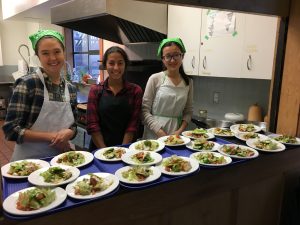We started here together and now we are leaving the same way.
—Group 16
Hello again! Sadly, this will be our last blog posting for this term. We hope you have enjoyed following us on our journey through LFS 350. We have learned a lot from our experiences with GNH and from working together. In this last blog, we would like to share with you one of our main moments of significance. A moment of significance which we all recall well was our second visit to GNH. We gained significant knowledge of the neighbourhood house, as well as became emotionally connected to the centre, the staff and the community members.

Photo credit: Ula Zhu
What?
We went to GNH for the second time to implement our healthy meal into the Pay-What-You-Can (PWYC) Wednesday lunch. Before the lunch started, we explained to the community members who we were, why we were there and what we were doing. The community members were welcoming, kind, receptive, and encouraging. At first, we were worried that the implementation of a new meal would be a significant change from previous Wednesday meals and therefore not be accepted. We were fortunate to experience the PWYC meal from start to finish. We set up the room, prepared the meal, served the meal, communicated with the members, and finally cleaned up the kitchen and lunchroom afterwards. Collectively, we agreed, that this was one of the positive experiences in this course. We thoroughly enjoyed our last visit and being able to be apart of the community. It was fun for schoolwork to be in the form of experiential learning and community engagement rather than exams, readings and lectures. Additionally, having the opportunity to gain practical experience in the community has been a pivotal moment of significance for our group. We are able to see how these practical applications help improve community food security. This CBEL promotes community food security by adding more variety of food that’s appreciated by participants.
So what?
During our last visit, we interviewed and listened to community members, staff, and volunteers. There are several things that we learned along this adventure that we could not have learned while sitting in the classroom. For example, one of the volunteers explained some of the challenges faced by members who live in the West End of Vancouver. There are some individuals who have mobility issues and are unable to access GNH.
We observed community members enjoying their lunch and learned that besides the low cost meal, much of the enjoyment was being able to eat among friends, meet with new people, and interact with others. Fundamentally, GNH recognizes that “food brings us together and can act as vehicle for community-building” (Gordon Neighbourhood House, 2016). Moreover, Stephanie Shulhan, the community programmer, explained that the lunch program is socially appreciated by the participants (personal communication, 2016). There were a few members who thought that the chilli was too spicy, but they enjoyed the gathering nonetheless.
Kirk et al. (2001) found that daytime meal programs, much like PWYC at GNH, are frequented by people who live alone and in isolation. Most peeople who attend the meal programs endure the financial aspect because they appreciate the social environment; suggesting that lunch programs are an essential social opportunity for those who live alone (Kirk, Waldrop, & Rittner, 2001).
It is interesting seeing our lessons from class come to life. LFS 350 has taught us that listening is key. Even though we may think that we are more privileged, we must be cautious and first listen to the community members. We almost made this mistake by wanting to implement our meal right away in the first visit! With little knowledge of how PWYC operates, the space of the kitchen, and the prefence of the community members, it would have been harder to help GNH improve their lunch program. Luckily, our community partner suggested that we should participate in the Wednesday lunch first to see how the program was managed. We were given the chance to listen to the community members, playing a critical role in the appreciation of our meal during the second visit.

Photo credit: Ula Zhu
Now what?
In addition to the enjoyable nature of our project, we expanded our knowledge through teamwork. We gathered effective team communication skills as it is important to agree with our intentions as a team prior to stepping foot into the community centre. Also, as we mentioned earlier, it is of grave importance to understand the community centre before implementing changes. We therefore gathered that we can gain trust in the people, and that in trusting us they will be more tolerable to change.
As a team, we are quite social and quick to respond on group social media. Having full participation of the members of our team, made the semester and the project a positive experience. We were able to connect with the community members and share our own stories. Speaking with the community members, we were able to learn about them and vice versa.
Although our journey with LFS 350 is approaching to an end, our interest in community involvement will never stop. We are thankful for having the opportunity to explore i n depth a community engagement programs. We can see how community program improvements can be implemented. We would love to utilize the knowledge we gained through this project in future community work. Overall, time and location permiting, we would love to return to volunteer at the GNH PWYC program again! Looking forward, we hope the LFS350 students in the next year will be able to continue with this amazing project and add more variety to GNH PWYC lunch program. We also do wish the chilli soup become sustainable and enjoyed by more community members! All the best to Gordon Neighbourhood House!!!
n depth a community engagement programs. We can see how community program improvements can be implemented. We would love to utilize the knowledge we gained through this project in future community work. Overall, time and location permiting, we would love to return to volunteer at the GNH PWYC program again! Looking forward, we hope the LFS350 students in the next year will be able to continue with this amazing project and add more variety to GNH PWYC lunch program. We also do wish the chilli soup become sustainable and enjoyed by more community members! All the best to Gordon Neighbourhood House!!!
References
Kirk, A. B., Waldrop, D. P., & Rittner, B. A. (2001). More than a meal: The relationship between social support and quality of life in daytime meal program participants. Journal of Gerontological Social Work, 35(1), 3-20. doi:10.1300/J083v35n01_02
Gordon Neghbourhood House. (2016). Food Philosophy. Retrieved from http://gordonhouse.org/about-gordon-neighbourhood-house/right-to-food/
